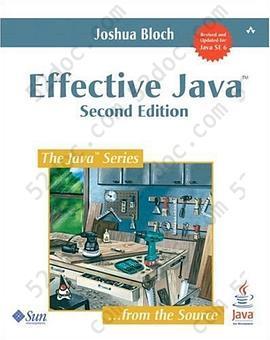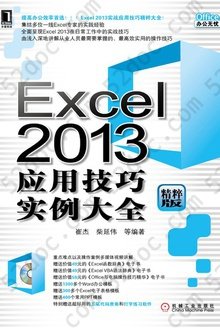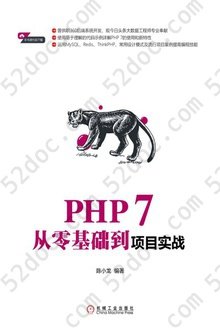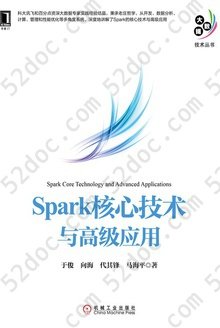注重体验与质量的电子书资源下载网站
分类于: 云计算&大数据 设计
简介

Effective Java: Second Edition: Java 豆 9.3分
资源最后更新于 2020-07-28 14:41:55
作者:[美] Joshua Bloch
出版社:Addison-Wesley
出版日期:2008-01
ISBN:9780321356680
文件格式: pdf
标签: java Java 编程 计算机 programming 软件开发 程序设计 Effective
简介· · · · · ·
Written for the working Java developer, Joshua Bloch's Effective Java Programming Language Guide provides a truly useful set of over 50 best practices and tips for writing better Java code. With plenty of advice from an indisputable expert in the field, this title is sure to be an indispensable resource for anyone who wants to get more out of their code.
As a veteran developer ...
目录
Foreword
Preface
Acknowledgments
1 Introduction
2 Creating and Destroying Objects
Item 1: Consider static factory methods instead of constructors
Item 2: Consider a builder when faced with many constructor parameters
Item 3: Enforce the singleton property with a private constructor or an enum type
Item 4: Enforce noninstantiability with a private constructor
Item 5: Avoid creating unnecessary objects
Item 6: Eliminate obsolete object references
Item 7: Avoid finalizers
3 Methods Common to All Objects
Item 8: Obey the general contract when overriding equals
Item 9: Always override hashCode when you override equals
Item 10: Always override toString
Item 11: Override clone judiciously
Item 12: Consider implementing Comparable
4 Classes and Interfaces
Item 13: Minimize the accessibility of classes and members
Item 14: In public classes, use accessor methods, not public fields
Item 15: Minimize mutability
Item 16: Favor composition over inheritance
Item 17: Design and document for inheritance or else prohibit it
Item 18: Prefer interfaces to abstract classes
Item 19: Use interfaces only to define types
Item 20: Prefer class hierarchies to tagged classes
Item 21: Use function objects to represent strategies
Item 22: Favor static member classes over nonstatic
5 Generics
Item 23: Don't use raw types in new code
Item 24: Eliminate unchecked warnings
Item 25: Prefer lists to arrays
Item 26: Favor generic types
Item 27: Favor generic methods
Item 28: Use bounded wildcards to increase API flexibility
Item 29: Consider typesafe heterogeneous containers
6 Enums and Annotations
Item 30: Use enums instead of int constants
Item 31: Use instance fields instead of ordinals
Item 32: Use EnumSet instead of bit fields
Item 33: Use EnumMap instead of ordinal indexing
Item 34: Emulate extensible enums with interfaces
Item 35: Prefer annotations to naming patterns
Item 36: Consistently use the Override annotation
Item 37: Use marker interfaces to define types
7 Methods
Item 38: Check parameters for validity
Item 39: Make defensive copies when needed
Item 40: Design method signatures carefully
Item 41: Use overloading judiciously
Item 42: Use varargs judiciously
Item 43: Return empty arrays or collections, not nulls
Item 44: Write doc comments for all exposed API elements
8 General Programming
Item 45: Minimize the scope of local variables
Item 46: Prefer for-each loops to traditional for loops
Item 47: Know and use the libraries
Item 48: Avoid float and double if exact answers are required
Item 49: Prefer primitive types to boxed primitives
Item 50: Avoid strings where other types are more appropriate
Item 51: Beware the performance of string concatenation
Item 52: Refer to objects by their interfaces
Item 53: Prefer interfaces to reflection
Item 54: Use native methods judiciously
Item 55: Optimize judiciously
Item 56: Adhere to generally accepted naming conventions
9 Exceptions
Item 57: Use exceptions only for exceptional conditions
Item 58: Use checked exceptions for recoverable conditions and runtime exceptions for programming errors
Item 59: Avoid unnecessary use of checked exceptions
Item 60: Favor the use of standard exceptions
Item 61: Throw exceptions appropriate to the abstraction
Item 62: Document all exceptions thrown by each method
Item 63: Include failure-capture information in detail messages
Item 64: Strive for failure atomicity
Item 65: Don't ignore exceptions
10 Concurrency
Item 66: Synchronize access to shared mutable data
Item 67: Avoid excessive synchronization
Item 68: Prefer executors and tasks to threads
Item 69: Prefer concurrency utilities to wait and notify
Item 70: Document thread safety
Item 71: Use lazy initialization judiciously
Item 72: Don't depend on the thread scheduler
Item 73: Avoid thread groups
11 Serialization
Item 74: Implement Serializable judiciously
Item 75: Consider using a custom serialized form
Item 76: Write readObject methods defensively
Item 77: For instance control, prefer enum types to readResolve
Item 78: Consider serialization proxies instead of serialized instances
Appendix: Items Corresponding to First Edition
References
Index
Preface
Acknowledgments
1 Introduction
2 Creating and Destroying Objects
Item 1: Consider static factory methods instead of constructors
Item 2: Consider a builder when faced with many constructor parameters
Item 3: Enforce the singleton property with a private constructor or an enum type
Item 4: Enforce noninstantiability with a private constructor
Item 5: Avoid creating unnecessary objects
Item 6: Eliminate obsolete object references
Item 7: Avoid finalizers
3 Methods Common to All Objects
Item 8: Obey the general contract when overriding equals
Item 9: Always override hashCode when you override equals
Item 10: Always override toString
Item 11: Override clone judiciously
Item 12: Consider implementing Comparable
4 Classes and Interfaces
Item 13: Minimize the accessibility of classes and members
Item 14: In public classes, use accessor methods, not public fields
Item 15: Minimize mutability
Item 16: Favor composition over inheritance
Item 17: Design and document for inheritance or else prohibit it
Item 18: Prefer interfaces to abstract classes
Item 19: Use interfaces only to define types
Item 20: Prefer class hierarchies to tagged classes
Item 21: Use function objects to represent strategies
Item 22: Favor static member classes over nonstatic
5 Generics
Item 23: Don't use raw types in new code
Item 24: Eliminate unchecked warnings
Item 25: Prefer lists to arrays
Item 26: Favor generic types
Item 27: Favor generic methods
Item 28: Use bounded wildcards to increase API flexibility
Item 29: Consider typesafe heterogeneous containers
6 Enums and Annotations
Item 30: Use enums instead of int constants
Item 31: Use instance fields instead of ordinals
Item 32: Use EnumSet instead of bit fields
Item 33: Use EnumMap instead of ordinal indexing
Item 34: Emulate extensible enums with interfaces
Item 35: Prefer annotations to naming patterns
Item 36: Consistently use the Override annotation
Item 37: Use marker interfaces to define types
7 Methods
Item 38: Check parameters for validity
Item 39: Make defensive copies when needed
Item 40: Design method signatures carefully
Item 41: Use overloading judiciously
Item 42: Use varargs judiciously
Item 43: Return empty arrays or collections, not nulls
Item 44: Write doc comments for all exposed API elements
8 General Programming
Item 45: Minimize the scope of local variables
Item 46: Prefer for-each loops to traditional for loops
Item 47: Know and use the libraries
Item 48: Avoid float and double if exact answers are required
Item 49: Prefer primitive types to boxed primitives
Item 50: Avoid strings where other types are more appropriate
Item 51: Beware the performance of string concatenation
Item 52: Refer to objects by their interfaces
Item 53: Prefer interfaces to reflection
Item 54: Use native methods judiciously
Item 55: Optimize judiciously
Item 56: Adhere to generally accepted naming conventions
9 Exceptions
Item 57: Use exceptions only for exceptional conditions
Item 58: Use checked exceptions for recoverable conditions and runtime exceptions for programming errors
Item 59: Avoid unnecessary use of checked exceptions
Item 60: Favor the use of standard exceptions
Item 61: Throw exceptions appropriate to the abstraction
Item 62: Document all exceptions thrown by each method
Item 63: Include failure-capture information in detail messages
Item 64: Strive for failure atomicity
Item 65: Don't ignore exceptions
10 Concurrency
Item 66: Synchronize access to shared mutable data
Item 67: Avoid excessive synchronization
Item 68: Prefer executors and tasks to threads
Item 69: Prefer concurrency utilities to wait and notify
Item 70: Document thread safety
Item 71: Use lazy initialization judiciously
Item 72: Don't depend on the thread scheduler
Item 73: Avoid thread groups
11 Serialization
Item 74: Implement Serializable judiciously
Item 75: Consider using a custom serialized form
Item 76: Write readObject methods defensively
Item 77: For instance control, prefer enum types to readResolve
Item 78: Consider serialization proxies instead of serialized instances
Appendix: Items Corresponding to First Edition
References
Index








